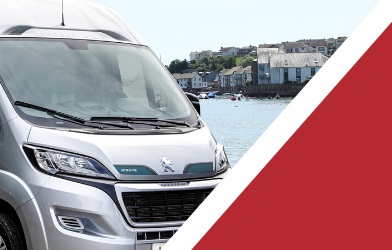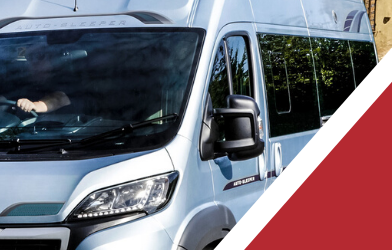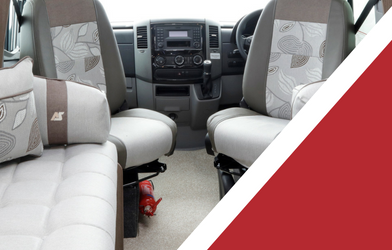Whether you are the proud new owner of a motorhome or a seasoned old hand, you almost certainly share a particular and important concern – and that is the need to insure your motorhome.
Motorhome insurance
Motorhome insurance is not just a recommendation; it is required by law the moment you take the vehicle onto the roads or drive it in any other public space.
The minimum legal requirement is for third party insurance. The reason for this minimum standard is simple – so that you have insurance to guarantee compensation to other road users or members of the public whom you injure or whose property you damage. Third party insurance, therefore, offers protection to those who suffer any loss because of your driving but in no way protects against loss or damage to your motorhome.
A modicum of additional protection may be provided by very basic motorhome insurance cover for third party, fire, and theft insurance – which adds some protection against the loss of your motorhome through fire or theft.
For the security of protection for any motorhome, you are almost certain to need the full insurance cover. And that means cover against all manner of theft, loss, and accidental damage – afforded by comprehensive motorhome insurance.
Although there are many potential providers, you might want to insist on arranging your cover with a specialist motorhome insurance provider who is going to understand the specific needs of a motorhome owner.
What elements of cover are available for motorhomes?
UK motorhome insurance typically covers a range of aspects designed to protect both the vehicle and its occupants. This specialised insurance offers various levels of protection, like car insurance, but with additional features tailored to the unique nature of motorhomes. Here’s a look at what motorhome insurance typically covers:
- Comprehensive Cover
Comprehensive cover is typically the most extensive type of motorhome insurance available. It usually includes:
- Accidental Damage: Covers repairs or replacement costs if your motorhome is damaged in an accident.
- Fire and Theft: Provides cover if your motorhome is stolen or damaged by fire.
- Vandalism: Covers damages resulting from vandalism.
- Windshield Damage: Often includes repairs or replacement of damaged windows and windshields.
- Third Party, Fire and Theft
This type of insurance offers more limited protection compared to comprehensive cover:
- Third Party Liability: Covers damage to other people’s property or injuries to others in an accident you cause.
- Fire and Theft: Includes cover if your motorhome is stolen or damaged by fire.
- Third Party Only
As we mentioned above, this is the minimum legal requirement in the UK. Third party only insurance typically covers:
- Third Party Liability: Provides cover for damage to others’ property and injuries to others if you are at fault in an accident. It does not cover any damage to your motorhome or personal injuries.
- European Cover
Many UK motorhome insurance policies offer the option to add-on European cover, which is essential if you plan to travel outside the UK:
- Travel in Europe: Typically provides the same level of cover as in the UK while traveling in European countries. Duration and countries covered may vary by policy.
- Personal Belongings
Motorhome insurance often includes cover for personal belongings:
- Contents Cover: Protects personal items inside the motorhome against theft, loss, or damage. There might be a limit on the total amount covered and for individual items.
- Equipment and Accessories
Motorhomes come with various built-in and additional accessories, and insurance policies often cover these:
- Fitted Equipment: Includes cover for built-in fixtures such as kitchens, bathrooms, and entertainment systems.
- Portable Equipment: Covers items like awnings, gas bottles, and camping gear.
- Breakdown and Recovery
Breakdown and recovery options can be added to motorhome insurance policies:
- Roadside Assistance: Provides help if your motorhome breaks down on the road.
- Recovery Service: Includes towing to the nearest garage or your home if the motorhome cannot be fixed on the spot.
- Home Start: Helps if the motorhome won’t start at home.
- Legal Expenses
Legal expenses cover is another common feature:
- Legal Costs: Covers legal fees for claims made against you or for recovering uninsured losses after an accident.
- Emergency Accommodation
If your motorhome becomes uninhabitable following an incident, some policies offer:
- Emergency Accommodation: Covers the cost of alternative accommodation while your motorhome is being repaired.
- New for Old Replacement
For newer motorhomes, this feature may be included:
- New for Old Replacement: If your motorhome is written off or stolen within a certain period (usually up to two years old), it will be replaced with a new one of the same make and model.
- Loss of Use
If your motorhome is unusable due to a covered event, some policies provide:
- Loss of Use: Offers compensation or a replacement vehicle if your motorhome is out of action for repairs.
Security
Buying a motorhome is a big investment and you want to protect that investment with the most suitable insurance. So, if you are wondering “what motorhome insurance should I get?”, then comprehensive cover may be a consideration because of the sheer value of your motorhome and its vulnerability to theft, attempted theft, and break-ins.
That, in turn, makes security of your vehicle of paramount importance – to you and to your insurer.
There are a wide range of security devices and systems designed to hinder or prevent the theft of your motorhome itself and its equally valuable contents. When adding further security to your motorhome, always ensure that any components have received the Thatcham seal of approval and certification – an organisation that sets the benchmark in vehicle security.
There are several distinct categories of security equipment – from electronic alarms and immobilisers to vehicle trackers to aid the tracing and recovery of stolen motorhomes.
Whatever categories of security demanded by your motorhome insurers – or categories which earn valuable discounts on the price of the premiums you pay – here at Derby Motorhomes we have the experience and expertise to advise you on ways of meeting those standards (which are already likely to have been met by any vehicle we supply).
Valuations
It is essential to have an accurate and up to date valuation of your motorhome and its contents for insurance purposes. The total sum insured is the maximum amount any insurer is obliged to pay out in the event of a successful claim, and you want to make sure it is sufficient for the repair to any damage or the replacement of your motorhome if it is a total loss.
Once again, our expertise and experience here at Derby Motorhomes may help you arrive at a realistic and up to date valuation of your motorhome and its contents.
Who’s driving?
As with any type of motor insurance, your motorhome insurance also needs to account for the number and identities of those who are covered to drive.
The most comprehensive cover is given by policies that cover any driver, but you might choose to restrict driving to named drivers only or even to yourself alone in order to gain further discounts on your premiums.
Excess
Your motorhome insurance may already incorporate a compulsory excess which is payable in the event of a successful claim, but you might opt to accept a further voluntary excess in return for potentially cheaper premiums.
No claims discount
Just as with the insurance for the car you drive, in some cases, motorhome insurance typically offers valuable discounts on the price of your premiums if you remain claims-free from one year to the next – remember to make sure that any no claims discount to which you are entitled is reflected in your quotation or renewal notice.
Where is your motorhome being stored?
You may receive motorhome insurance discounts if you store your motorhome in a secure, dedicated storage facility, preferably a CASSOA-approved site.
CASSOA (Caravan Storage Site Owners’ Association) Approved Sites are storage facilities that meet high standards of security and management.
These locations offer high levels of security that can significantly reduce the risk of theft or damage, typically making them favourable in the eyes of insurers.
GAP insurance and other insurance cover
Finally, remember that there are additional types of insurance you may wish to consider for your motorhome such as GAP Insurance (which covers a shortfall in value if on motorhome finance), motorhome warranty, breakdown cover, and travel and health insurance.
Conclusion
Motorhome insurance is designed to offer financial protection for motorhome owners, covering a wide range of potential risks and scenarios. From accidental damage and theft to personal belongings and legal expenses, these policies provide peace of mind for motorhome enthusiasts whether they are at home or on the road.
When choosing a policy, it’s important to compare cover options, limits, and additional features to ensure you get the most suitable protection for your needs.




